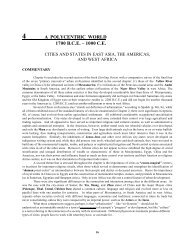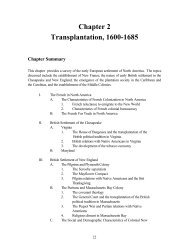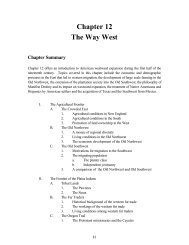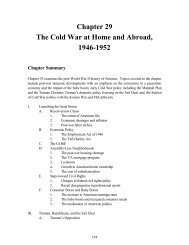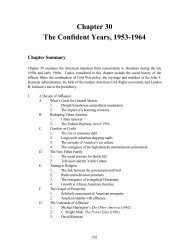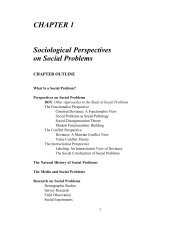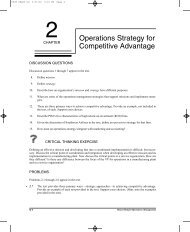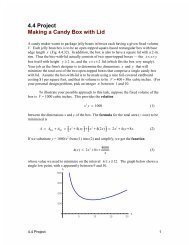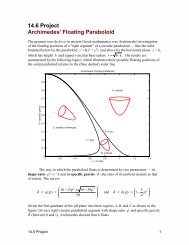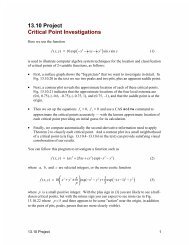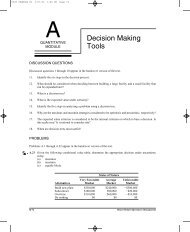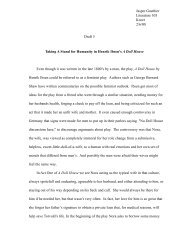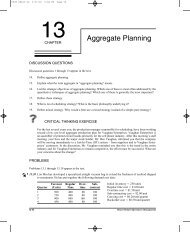Chapter 4 Convergence and Conflict, 1660-1763
Chapter 4 Convergence and Conflict, 1660-1763
Chapter 4 Convergence and Conflict, 1660-1763
You also want an ePaper? Increase the reach of your titles
YUMPU automatically turns print PDFs into web optimized ePapers that Google loves.
<strong>Chapter</strong> 4<br />
<strong>Convergence</strong> <strong>and</strong> <strong>Conflict</strong>, <strong>1660</strong>-<strong>1763</strong><br />
<strong>Chapter</strong> Summary<br />
<strong>Chapter</strong> 4 explores the transformation of the colonies’ relationship with Britain between <strong>1660</strong><br />
<strong>and</strong> the end of the French <strong>and</strong> Indian War. The closeness between mother country <strong>and</strong><br />
colonies during the late seventeenth <strong>and</strong> early eighteenth centuries is treated with a look at such<br />
issues as the British imperial trade system, cultural <strong>and</strong> social connections between Britain <strong>and</strong><br />
the colonies <strong>and</strong> the nature of political thought in the colonies <strong>and</strong> Britain. By the mid-eighteenth<br />
century, tensions mount with an exploration of renewed competition in North America among<br />
Britain, France <strong>and</strong> Spain. The chapter ends by examining imperial warfare in the eighteenth<br />
century with a special emphasis on the French <strong>and</strong> Indian War <strong>and</strong> its impact on relations<br />
between the colonies <strong>and</strong> Britain.<br />
I. Economic Development <strong>and</strong> Imperial Trade in the British Colonies<br />
A. The Regulation of British Trade<br />
B. The Colonial Export Trade<br />
C. Colonial Imports <strong>and</strong> the Nature of the Credit System<br />
D. The Development of Colonial Urbanization<br />
II. Eighteenth-Century Cultural Development in the Colonies<br />
A. Colonial Housing <strong>and</strong> Household Goods<br />
B. Colonial Intellectual Development<br />
1. The Enlightenment<br />
2. The Great Awakening<br />
III. The World of Colonial Politics<br />
A. The Dominion of New Engl<strong>and</strong><br />
B. The Impact of the Glorious Revolution of 1688<br />
C. Differences <strong>and</strong> Similarities between Colonial <strong>and</strong> British<br />
Political Ideology<br />
IV. Colonial Expansion During the Eighteenth Century<br />
A. British Settlement of the American Backcountry<br />
B. Spanish Settlement in Texas <strong>and</strong> California<br />
C. French Settlement of the Mississippi Valley<br />
33
V. Eighteenth-Century Colonial Warfare<br />
A. Colonial Warfare from 1689-1738<br />
1. King William’s War<br />
2. Queen Anne’s War<br />
B. King George’s War, 1739-1754<br />
C. The French <strong>and</strong> Indian War, 1756-<strong>1763</strong><br />
1. The Albany Congress<br />
2. The contributions of Britain <strong>and</strong> the colonies<br />
3. The Treaty of Paris of <strong>1763</strong><br />
VI. Conclusion<br />
Learning Objectives<br />
After a careful examination of <strong>Chapter</strong> 4, the student should be able to:<br />
1. Explain the concept of mercantilism <strong>and</strong> offer examples of British trade legislation that<br />
was designed to promote this economic policy.<br />
2. Explain the colonial system of credit <strong>and</strong> how it impacted colonial consumption of<br />
British goods.<br />
3. Discuss the characteristics of eighteenth-century colonial urban centers.<br />
4. Describe the intellectual development of the colonists including literacy rates, the nature<br />
of popular literature <strong>and</strong> the intellectual development of women.<br />
5. Explain the Age of the Enlightenment <strong>and</strong> its impact on colonial intellectual development.<br />
6. Explain the Great Awakening <strong>and</strong> its impact on theology <strong>and</strong> religious style in the<br />
American colonies.<br />
7. Discuss the major trends in British colonial administration from the mid-seventeenth to<br />
the mid-eighteenth century.<br />
8. Explain the impact of the Glorious Revolution of 1688 on the administration of the<br />
American colonies.<br />
9. Explain the terms actual representation <strong>and</strong> virtual representation <strong>and</strong> how they<br />
reflected the diverging political ideologies of the American colonies <strong>and</strong> Britain.<br />
34
10. Describe the settlement of the American backcountry <strong>and</strong> explain the social tensions<br />
that emerged between the older, established eastern communities <strong>and</strong> the western backcountry.<br />
11. Explain Spanish expansion into North America, particularly Texas <strong>and</strong> California <strong>and</strong><br />
speculate about what that expansion will mean to the American colonies as well as the future<br />
United States.<br />
12. Describe the French movement into the Mississippi Valley <strong>and</strong> connect that<br />
development to the future French <strong>and</strong> Indian War.<br />
13. Explain the impact of colonial wars on the Iroquois League <strong>and</strong> the importance of the<br />
Gr<strong>and</strong> Settlement of 1701.<br />
14. Define the Albany Congress <strong>and</strong> the reasons for its successes <strong>and</strong> failures.<br />
15. Explain the terms of the Treaty of Paris of <strong>1763</strong> <strong>and</strong> explain its potential for changing<br />
the relationship between the American colonies <strong>and</strong> Britain after the French <strong>and</strong> Indian War.<br />
Topics for Classroom Lectures<br />
1. Discuss the methods of cultivating the major staple crops produced in the British colonies.<br />
Explain the labor intensity of raising sugar cane <strong>and</strong> tobacco; make a distinction between the<br />
long staple cotton grown in coastal Carolina <strong>and</strong> Georgia <strong>and</strong> short staple cotton which will be<br />
the “King Cotton” of the antebellum South; <strong>and</strong>, point out the intricacies of rice cultivation in the<br />
coastal South.<br />
2. Create a slide presentation of American colonial dwellings from New Engl<strong>and</strong>, the<br />
Middle colonies <strong>and</strong> the South. Trace the various architectural features to origins in Engl<strong>and</strong>.<br />
Also, point out how the architectural distinctions reflect the cultural, social <strong>and</strong> climate<br />
differences among the major colonial regions.<br />
3. Discuss the settlement of the American backcountry during the early eighteenth century.<br />
How did the settlers of this area differ from the settlers of the seventeenth century? Consider<br />
the religious, regional, cultural <strong>and</strong> moral backgrounds of the settlers. How would these issues<br />
define the relationship between the settlers of the backcountry <strong>and</strong> the established eastern<br />
population?<br />
35
Topics for Class Discussion <strong>and</strong> Essays<br />
1. Have students discuss the Enlightenment <strong>and</strong> the Great Awakening as intellectual<br />
preludes to the American Revolution. Connect enlightened political thought to the Glorious<br />
Revolution of 1688 <strong>and</strong> the writings of John Locke. Use these issues to predict Thomas<br />
Jefferson’s writing of the Declaration of Independence. Connect the Great Awakening to the<br />
cultural unification of the colonies <strong>and</strong> the emphasis on individual religious choice <strong>and</strong> autonomy.<br />
How do these developments help prepare colonists for revolutionary thinking? Why have<br />
historians linked the tradition of American religious revolution to their experience with political<br />
revolution?<br />
2. Will the American Revolution be “revolutionary?” Have students look at the nature of<br />
British colonial administration <strong>and</strong> explain how it contributed to the American love of liberty. In<br />
fighting for independence <strong>and</strong> freedom, will Americans be fighting for something with which they<br />
are unfamiliar? Will they be fighting for political change or for a status of independence they had<br />
come to expect by the mid-eighteenth century?<br />
Topics for Term Papers <strong>and</strong> Class Projects<br />
1. Explore the development of rice cultivation in South Carolina. Trace the African origins<br />
of this agriculture, how it was brought to Carolina settlers <strong>and</strong> its impact on the economic <strong>and</strong><br />
social development of South Carolina.<br />
2. Explore the importance of the Great Awakening to the American South. How did the<br />
movement impact the emergence of Southern religious style? What was the particular impact of<br />
the Great Awakening on the Southern backcountry?<br />
3. Research the causes of the Salem witch trials. A variety of historical <strong>and</strong> scientific<br />
studies offer many dimensions to the possible origins of this unusual phenomenon in American<br />
history.<br />
36
Resources for Lectures <strong>and</strong> Research Projects<br />
Paul S. Boyer <strong>and</strong> Stephen Nissenbaum, Salem Possessed (1974).<br />
John Demos, Entertaining Satan: Witchcraft <strong>and</strong> the Culture of Early New Engl<strong>and</strong><br />
(1982).<br />
David Hackett Fischer, Albion’s Seed: Four British Folkways in America (1989).<br />
Richard Hofstadter, America at 1750: A Social Portrait (1971).<br />
Carol Karlsen, The Devil in the Shape of a Woman: Witchcraft in Colonial New Engl<strong>and</strong><br />
(1987).<br />
Frank Lambert, Inventing the “Great Awakening” (1999).<br />
Henry F. May, The Enlightenment in America (1976).<br />
Audio-Visual Resources<br />
Biography: Benjamin Franklin: Citizen of the World, A&E Video, 50 minutes.<br />
This video from the A&E Biography series examines the eclectic life of Benjamin Franklin <strong>and</strong><br />
presents a nice accompaniment to the study of the Enlightenment in the colonies.<br />
In Search of History: The Salem Witch Trials, A&E Video, 50 minutes.<br />
This video explores the witch trials of Salem, Massachusetts with a look at various social,<br />
psychological, <strong>and</strong> cultural explanations for the event.<br />
37



